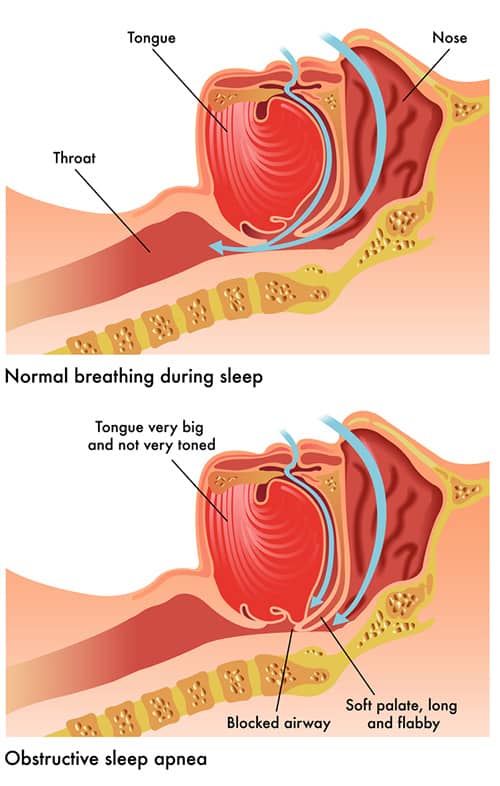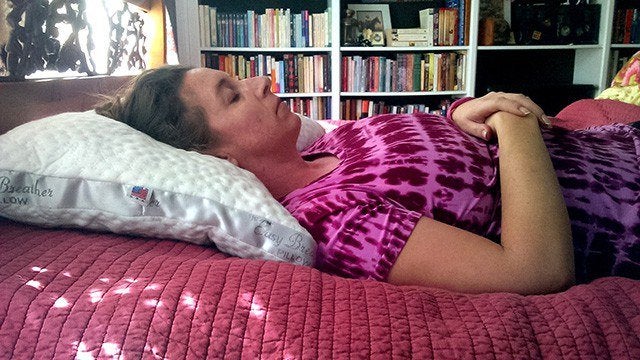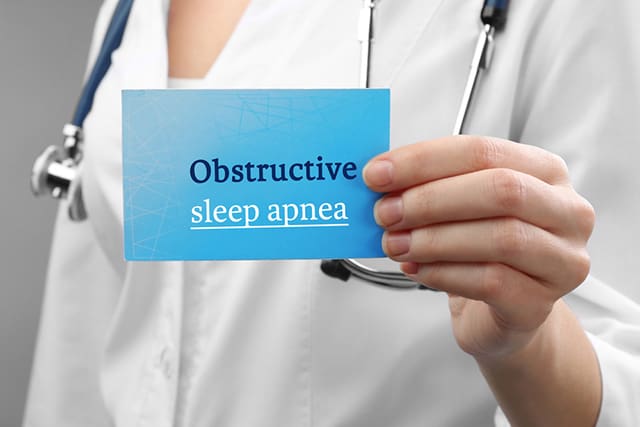Whether it’s you or your partner or even your roommate, most of us experience the detriments of snoring at some point in our lives. Snoring is one of the most common sleep conditions that cause loss of sleep, but snoring itself is not a sleep disorder. However, it is symptomatic of many different sleep disorders, some extremely dangerous, so it’s important to identify the reason behind the snoring that occurs.
To do that, you have to first understand the dynamics of snoring and how it happens. Then, you need to be aware of the various disorders it can signal as an underlying cause of the problem. Identifying the disorder from which you suffer can be difficult because there are so many, but armed with the knowledge of other risk factors and symptoms, you may be able to pinpoint whether or not your snoring requires a doctor’s expertise.
The Science of Snoring
First, you need to understand what snoring actually is. When you sleep, you breathe through your nose or mouth, and the air goes down your throat, through your trachea, and into your lungs. When this passageway is opened properly, you breathe easily without making a sound, not even that soft puppy dog ‘snuffle’. You simply inhale and exhale, and your body rests easily.
However, snoring occurs when those passageways are not fully open. This is typically caused by something either constricting (narrowing) the airway or blocking it, partially or entirely. When this happens, there is greater force and pressure required to draw air into the lungs, and it causes the tissues around the airway to vibrate, which is the source of the snore.
The blockage or constriction can occur in any part of the passageway, from the nose and sinuses or the mouth to the throat, which means you have to first find the source of the problem before you can make a proper diagnosis or begin to treat the condition.
Simple Solutions
It’s important to find ways to reduce your snoring, whether for your own benefit or that of the people in your home. Because snoring can interrupt sleep for you and others, it can lead to a disruption in your circadian rhythm, or the natural cycle of waking and sleep based on the 24-hour period of daylight and dark. This is detrimental because your body and brain are accustomed to being awake during the day and sleeping at night. The interruption at night turns that around so you’re exhausted during the day, and when you can’t get the sleep you need, other health factors pop up.
Several simple solutions are known to ease the impact of snoring, especially when it’s so loud that it’s affecting your sleep and the sleep of those around you, including romantic partners, family, and roommates. For example, it’s suggested that you sleep on your side rather than your back to cut down on snoring. There are also strips sold over the counter that you put on your nose to help keep the airway from that avenue open while you sleep..
However, these are just ‘Band-Aids’ for the problem and don’t actually resolve anything that is causing you to snore. It’s important that, while you want to help improve everyone’s sleep as quickly and effectively as possible, you may also need to pursue additional medical help for a disease or disorder that is leading the blockages or restricted airways.
Other Symptoms Caused by Snoring
If you sleep alone, you may not even know that you snore, but there are certain signs and symptoms that add up to clues pointing to the fact that you may be suffering from chronic snoring. If you are experiencing at least four of the following symptoms, you may want to find out if you’ve been having a problem with snoring:
- Excessive tiredness during the day
- Difficulty concentrating or paying attention
- Sore throat first thing in the morning
- Frequent gasping and choking that wake you up at night
- Noted pauses in breathing during your sleep
- Chest pain during the night
- High blood pressure
- Unusual moodiness
- Reduced performance at work
- General irritation and intolerance with others.
Excessive tiredness
Sore Throat
If several of these symptoms sound familiar, it may be time to see a physician. However, if you want to check for yourself first, set up a recording device before you go to bed and see if you catch yourself snoring.
Common Causes of Snoring
While there are numerous causes that can lead to snoring, some of the most common ones are related to things that are hard to change. For example, certain medications can cause snoring to occur, based on your body’s chemical reaction to the drug. Consumption of alcohol will cause heavy snoring, partly because it relaxes the muscles, including those that hold the tissue around your airways in place, making them more susceptible to the vibration.
Because certain parts of the sleep cycle are more prone to involve snoring, there is little to be done about that. However, snoring caused by sleep cycle is usually light and of no serious harm, unless there’s another underlying condition. The position in which you sleep can also cause and worsen snoring. If you sleep on your back, your airways are more likely to become blocked or constricted, simply because gravity and weight press down on your body and lead to narrower passages. Even age and the loss of some muscle tension in older people can lead to heavier snoring.
You may be interested in: Wedge Pillows: Do They Help With Snoring Problems?
Of course, there are plenty of other conditions that can be the culprit, so while you may try sleeping on your side, you also might want to get a clean bill of health from your doctor before blowing off the idea it could be anything more serious.
Snoring and Obstructions
Your body is a remarkable work of art, but it isn’t perfect. The formation of the airway passages can lead to several areas where obstruction could occur, causing snoring. The first to consider is the part of the nose called turbinates.
Your nose is divided into two airways or cavities, by a septum, which is a thin wall made of cartilage and bone and coated in mucosa. On each side, you have three nasal turbinates full of blood vessels used to regulate airflow. Sometimes, these become swollen and enlarged. While you have the natural shift that brings in the majority of air through one cavity or the other for a period and then switches, this isn’t a problem. One of your cavities will ‘shut off’ and allow the turbinates to reduce in size while the other side carries the brunt of the work. Several hours later, the two will switch. Sometimes, however, other factors keep this cycle from occurring properly.
For example, people with a chronically stuffy nose won’t experience this relief, and neither with those with a cold, those with seasonal allergies or any allergic reaction, or people breathing heavy amounts of cold air or tainted air full of large particles, such as dirt. The turbinates on both size will be inflamed, leading to obstruction of the airways.
Also, the septum that separates the two sides of your nose could be deviated. Sometimes this is a natural thing with a lack of perfection and symmetry in individuals, while most of the time, it’s from an accident of some sort that leads to a broken nose, in which the bone doesn’t heal straight. The deviation could leave one or both nasal cavities to be.
This leads to mouth breathing, as well, which can cause louder snoring due to rattling of the soft palate – a thin fleshy sheet that extends from the roof of your mouth to separate the mouth from the nasal passages. Also, if this flesh doesn’t move properly while breathing, it can block the airway, causing additional snoring. Other blockages are caused by an enlarged uvula, usually related to allergies, as well as swollen adenoids (tonsils), which is more common in children but can also plague adults.
Why So Serious?
While there are other symptoms of many underlying illnesses or conditions, snoring may be the only noteworthy one to alert you that you have a problem. Other symptoms may not be obvious or may take longer to develop. For example, it can be hard to identify sleep apnea without a doctor’s evaluation, and this condition can be quite serious.
Also, you may not be disturbed by your snoring as much as your family or partner are. It would be selfish to ignore an extreme problem that is causing other members of your household a severe lack of sleep, and it can also cause concern in those who care about you based on the potential underlying causes.
Risk Factors
While some risk factors associated with snoring are genetic, others can be controlled, if you know the problem and are willing to make the effort. Consider some of the common risk factors that lead to snoring:
- Structural abnormalities – Some of the examples above, such as a large uvula or deviated septum, fall into this category. Other potential genetic problems include a large tongue or generally narrow airways compared to average. While these can’t be controlled, some of them are operable, which can help improve your breathing during the night and minimize snoring.
-
-
- Obesity – Excess weight on the body is more than a burden and can affect more than your heart. In fact, carrying extra weight actually causes additional tissue to form in your neck, which weighs down on the airways. The narrowing of these passages leads to snoring and can actually be a factor in obstructive sleep apnea (OSA). Getting fit and losing weight can drastically improve your sleep and reduce or even stop snoring.
-
-
-
- Body position – As discussed earlier, if you sleep on your back, you’re more likely to snore. Drain yourself to sleep on your side by sewing a tennis ball to the back of your pajamas, which will keep you from comfortably rolling to your back, and you should see a great deal of improvement.
-
-
-
- Pregnancy – Because women commonly experience nasal congestion during pregnancy, they are more likely to snore. The good news is that, shortly after childbirth, the problem typically resolves itself, and there is no further concern about snoring.
-
-
-
- Alcohol and sedatives – We’ve already mentioned that using alcohol or a sedative before bed relaxes muscles, and this includes those in the throat and tongue. When these muscles are lax, you’re more susceptible to obstruction of the airways, which contributes heavily to snoring. Avoid having a ‘nightcap’, and consider something mild, such as melatonin (something your body produces normally anyway) if you absolutely need help falling asleep to avoid the opposite effect of restless sleep due to snoring.
-
-
-
- Smoking – The smoke inhalation can irritate parts of your airways without you ever realizing it – until your snoring becomes unmanageable. The lining of your nose and throat can become inflamed, narrowing airways, causing congestion, and really kicking up the amount and volume of snoring.
-
Sleep Apnea
One of the most dangerous underlying conditions that leads to particularly heavy snoring is obstructive sleep apnea (OSA). With sleep apnea, the blockage that constricts airways and causes snoring also leads to pauses in breathing, meaning that you aren’t getting any oxygen at all. The period of pause can be anywhere from a couple of seconds to over a minute, which can be quite dangerous.
Usually, OSA causes the person suffering the condition to wake suddenly, sometimes gasping and choking for air. This is frightening enough, but there are plenty of other risks that are increased with sleep apnea that are even more detrimental to health, including:
-
- Increased risk of heart attack and heart disease
- High blood pressure
- Increased risk of stroke
- Type 2 diabetes (cause or effect? 80% of diabetics have OSA)
- Adult asthma (potentially aggravated by OSA)
- Increased acid reflux (which can lead to esophageal cancer)
- Risk for car accidents (due to lack of sleep and grogginess)
How can you differentiate sleep apnea from general issues with snoring? There are a few important symptoms to consider that are more severe than those of a basic snoring issue.
-
- Memory problems, especially short term
- Difficulty concentrating and general ‘foggy’ mind
- Extreme irritability and inability to control reactions to irritants
- Frequent waking to use the restroom at night
- Pauses in breathing during the night (often waking with a start)
- Severe dry mouth and throat irritation, even leading to hoarseness
- Migraine level headaches, especially early in the day
Who is at Risk?
Technically, anyone can suffer from sleep apnea, just like anyone can have problems snoring. However, there are certain factors that weigh into your level of risk for suffering from the condition. The most important risk factor is obesity. Being overweight is not necessary to cause OSA, but with the increased fatty tissue that lies in and around your airways, it’s much more common for the air passages to collapse, and the risk is much higher.
Gender also plays a role in determining your risk for OSA. Men are 2 to 3 times more likely to experience OSA than women in general, although age can change those statistics as well, since postmenopausal women are far more likely to see problems with snoring and OSA, nearly equaling the risk factor for men.
And with talk of age, you have to take into account how old you are in determining if you’re more or less likely to have OSA. Likely due to loosening skin and weakening or loosening muscles, especially around the neck area, aging increases the risk factor for experiencing OSA. This is also true of general snoring but far more of a health factor when snoring is a symptom of sleep apnea. The risk seems to level off once you reach the age of 70, but it increases throughout your life from adulthood onward.
Diagnosing the Problem
The first step in determining the cause of your snoring is to consult with a doctor. Explain your symptoms and perceived severity and noise level of your snoring to the best of your ability. It might help if you had a recording or a description from your sleep partner or other household members, since you can’t exactly hear yourself snoring.
Typically, the doctor will perform a physical evaluation and consider your health history before making any further decisions or diagnoses. Depending on the inferences made during this exam, you may find several steps awaiting you in the diagnosis and treatment process. You may be referred to a sleep specialist or even a sleep study to determine the details of your snoring, including observing to see if there are pauses in your breathing indicative of OSA. In which case, the prescription of an anti-snoring device may be the best solution.
You may also be asked to make lifestyle changes, which include avoiding certain risk factors like particular medications and alcohol, and starting a diet and exercise regimen to lose weight. If allergies seem to be the culprit, the doctor may offer medication and treatment for this ailment in an attempt to stop the snoring.
In some cases, surgery in the back of the throat, roof of the mouth, or nasal cavities to relieve obstructions may be suggested. Mostly, these surgeries are as minimally invasive as possible, using a small scalpel or even lasers and microwaves. These can remove excess tissue, sculpt some of the parts that cause obstructions, straight a deviated nasal septum, or even tighten loose muscles to avoid the collapsing of airways and reduce vibration during breathing.
There are several appliances that may be prescribed to help you sleep without snoring. A dentist can construct an oral appliance that helps keep your airways open and certain tissues and muscles from obstructing your breathing, or you may want to use a nasal dilator. However, especially with OSA, the preferred device is a CPAP (continuous positive airway pressure) device. This particular appliance blows air from the room around you straight into your throat, bypassing the tongue and uvula, and also preventing any collapse in the throat due to lack of pressure.
Other Causes of Snoring
Other sleep disorders can lead to snoring as well, especially insomnia. Considering that loose muscles and tissue are the cause of the sound, you can imagine that suffering from insomnia, which means you have trouble falling asleep or staying asleep, experience a severe lack of rest. That means that the body has to conserve energy, and muscles may be so tense during the day as the sufferer tries to stay awake that they are as exhausted as the individual when the person finally does fall asleep.
Therefore, the muscles and tendons around the air passages are extremely lax based on exhaustion, and they can easily lead to a collapsing airway during the few hours of rest the person can manage.
Narcolepsy, which is a disease in which a person suddenly and without warning can fall asleep, is also a risk factor for snoring. This is likely due to the fact that narcolepsy itself has muscular and nervous difficulties, and that would likely extend to the muscles not being in control around the air passages.
You may be interested in: Best Earplugs to Block Out Snoring
The Bottom Line
Snoring is a problem, whether it’s a primary issue based on other small factors, such as sleep position, or whether it’s a symptom of another underlying condition that could be harmful to your health in more significant ways. Exploring your situation and finding potential causes that can be removed may be life-altering, once you realize what a difference it makes in the quality of your sleep – and the sleep of those around you.
However, it’s also vital to consult a doctor, especially if your symptoms point to something more than a deviated nasal septum or a bit too much alcohol late in the evening. You need to assess the danger your symptoms pose and see a physician to get diagnosed and find a treatment that will help save you from risks such as heart disease, diabetes, and more. Then, you’ll want to determine which treatment, device, surgery, and lifestyle changes can work together to create a happier, healthier you that isn’t disturbed by snoring or underlying conditions like insomnia and sleep apnea.



















